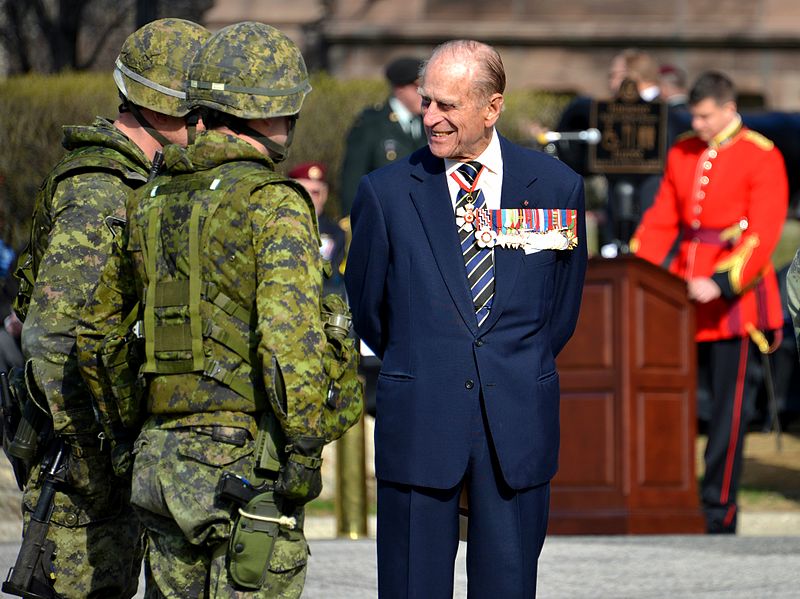
HRH Prince Philip, the Duke of Edinburgh, Colonel-in-Chief of the Royal Canadian Regiment, presenting the 3rd Battalion with their Regimental Colours, 17 April 2013. (via Wikipedia)
Mark Steyn on the announcement yesterday that His Royal Highness will be retiring from public appearances this fall:
Buckingham Palace announced today that the Duke of Edinburgh will retire from Royal engagements this autumn. He’ll be 96 next month, which is a quarter-century past the average retirement age – or four decades past it, if you’re a French or Greek civil servant.
His Royal Highness is the Queen’s consort. That’s an ill-defined role prone to an accumulation of frustrations: for Americans, think First Lady or Vice President for life. A lot of consorts are unpopular with their spouse’s subjects (for example, Queen Rania, Jordan’s current Hashemite hottie). Prince Philip has been doing it longer than anyone in the history of the Royal Family, since the day in 1952 when he and Princess Elizabeth were at Treetops in Kenya and received the news that George VI (the King’s Speech guy) had died. Harry Truman was in the White House; Stalin was in the Kremlin; some guy called Mao had just taken over in China. That’s a long time.
I last saw him five years ago in Glasgow with my daughter, who was impressed by how cool he was, and how spry for a nonagenarian. Elsewhere, opinions differ. He’s worshiped as a god in outlying parts of Vanuatu, but in Canberra the ruling Liberal Party went bananas and ended Tony Abbott’s premiership for giving the guy an Australian knighthood. Still and all, he’s kept the show on the road in an age hostile to the monarchical principle, and one which has seen the crowns of almost all his cousins come tumbling throughout Europe.
Steyn also recounts discussing the respective Australian and Canadian constitutions with Prince Philip during the Australian referendum on becoming a republic:
As a Canadian, I was somewhat distracted by the referendum Down Under, which I kept trying to slip into the conversation. But the Duke was inscrutable on that front – or perhaps, as I now think of it, quietly confident about victory. Toward the end, as he walked us to the door before my carriage turned back into a pumpkin, I made an offhand remark contrasting the 1901 Aussie constitution with the 1867 Canadian one, and the subject evidently engaged him, because he launched into a very well informed disquisition on the differences between the two. There were a half-dozen or so of us at dinner that night – an earl, a viscount, a baron, a knight, etc, plus a plain old mister (me). I’d assumed upon acceptance of my invitation that we guests would be there as unpaid jesters to amuse our Royal hosts. But, in fact, HRH was a quickwitted chap, and we were hard put to keep up with him.
One of my fellow diners, bemoaning the lack of agricultural workers in Britain, explained that his farm now brought in young Australians and South Africans, who were able to make ninety-to-a-hundred quid a day (about £60,000 a year) picking onions.
“Crying all the way to the bank?” said the Duke.
I thought that was a rather good line. Happy retirement.



